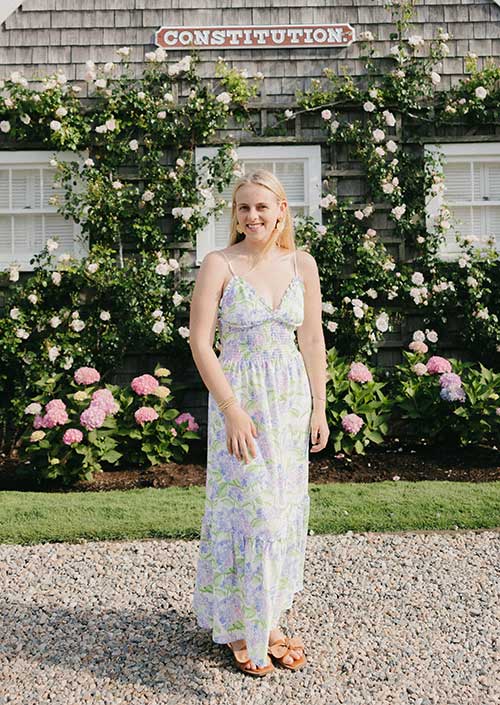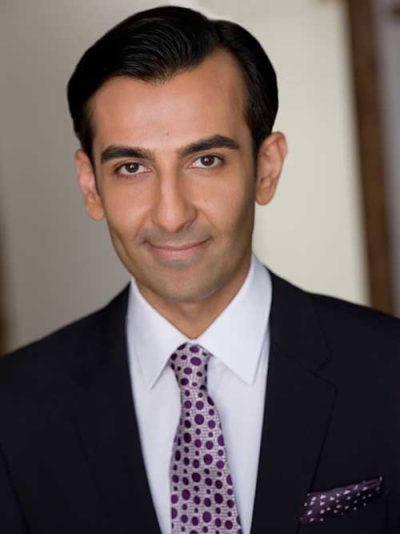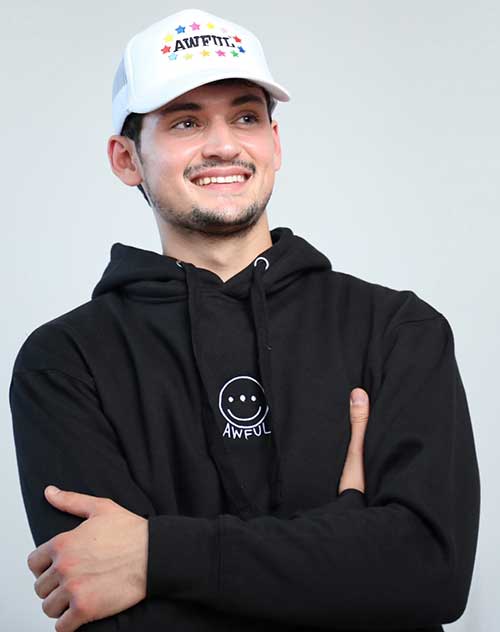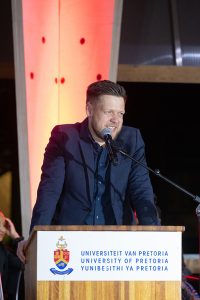“It’s really gratifying to see how many of the projects lean into our identity as a Jesuit institution,” said Ann Gaylin, dean of GSAS, “and strive to advance knowledge in the service of the greater good.”
Students displayed posters on topics that ranged from biology to theology to economics to psychology.
Nina Naghshineh, Ph.D. in Biological Sciences
Topic: The Role of Bacteria in Protecting Salamanders
How would you describe your research?
I study the salamander skin microbiome and how features of bacterial communities provide protection against a fungal pathogen that is decimating amphibian populations globally.
Why does this interest you?
I’m really interested in how microbes interact and function. My study system is this adorable amphibian, but the whole topic is so interesting because microbial communities are so complex and really hard to study. So the field provides many avenues for exploration. These types of associations are present in our guts and on our skin. I’m interested in going into human microbiome work after I graduate, so I have a lot of options available to me because of this research.
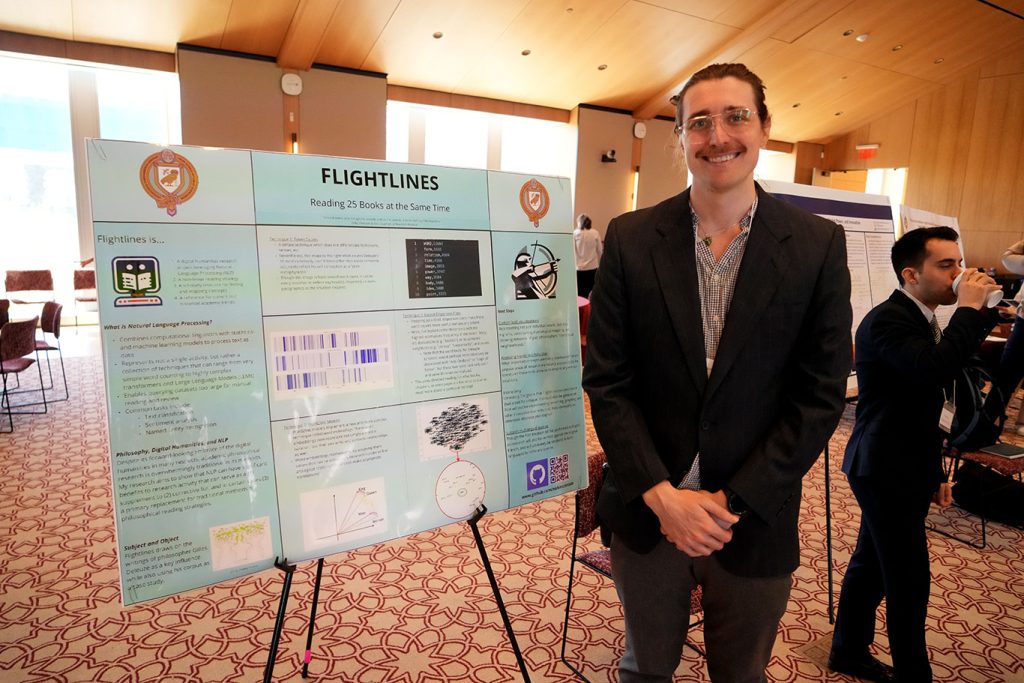
Nicholas McIntosh, Ph.D. in Philosophy
Topic: Using AI to Help Scholars Distill Information from a Vast Body of Texts
How would you describe your project?
It’s a digital humanities project that uses natural language processing to help read and understand many texts at once. There’s this vision we have of a really great humanities scholar who is able to know a text so well that they could almost quote it from memory. That is really difficult for us to do right now in the same way we might have when there were only a couple of touchstone classical texts.
What do you hope this will accomplish?
Scholars are scanning texts either for our classes or for our own research. So this would help us figure out, number one, how can you look at a text and be able to recognize— is this text useful for me? Number two, what are the most important concepts that we should be tracking in a text? And number three, what is the text as data telling us that maybe scholarship is overlooking or overemphasizing given traditional readings?
I would also like to show that those of us who do philosophy don’t have to be afraid of these technologies.
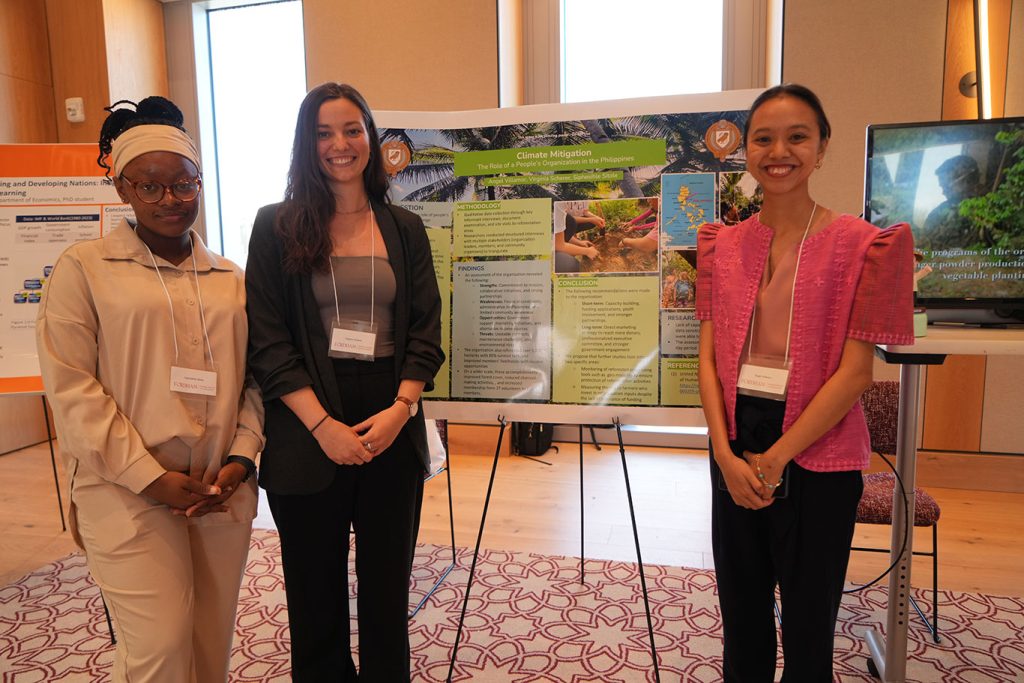
Angel Villamar, Siphesihle Sitole, and Virginia Scherer, M.A. in International Political and Economic Development (IPED)
Project name: Climate Mitigation: The Role of a People’s Organization in the Philippines
What were you investigating with this research?
We looked at the role of the grassroots organization Tulungan sa Kabuhayan ng Calawis in dealing with climate mitigation. It was formed after Typhoon Ketsana hit in 2009. There is an area right outside of Manila that, over the years, has been deforested, so this organization organized to help incentivize reforestation. The farmers in the area, who are mostly women, develop the seedlings, do the land preparation, and plant the trees.
What do you hope people learn from this project?
We want to think about reforestation not as a one-time thing but as a long-term sustainable way. What incentives do you need so that you can keep doing this? We are showing that you can involve ordinary individuals at the grassroots level in something that is much bigger than them.
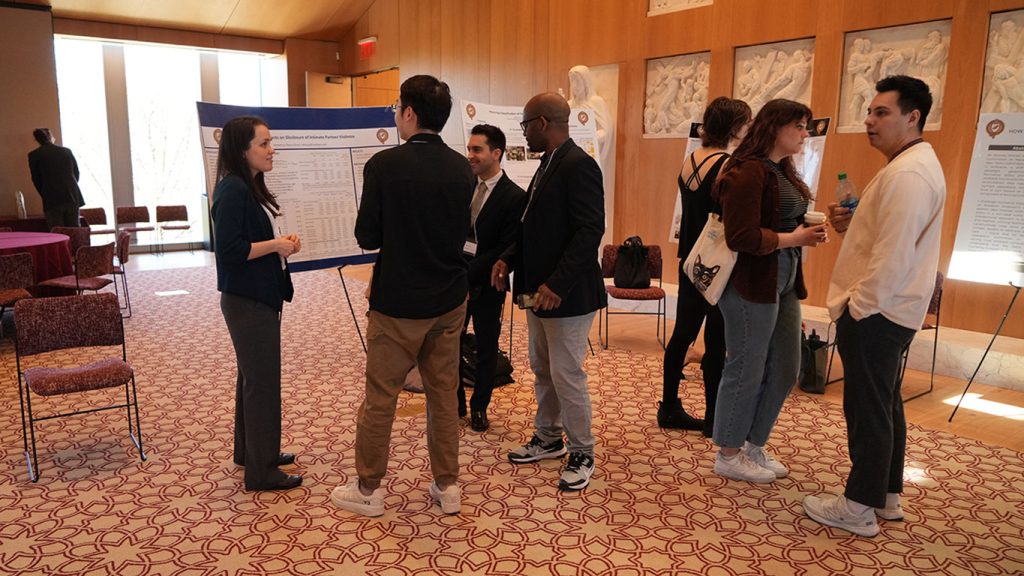
Answering a call from Pope Francis, Fordham is indeed a place committed to taking “concrete actions in the care of our common home.”
Here are some updates from the first quarter of 2024, from student sustainability interns to “cool” foods to fun community events that make an impact.
Facilities
In January, 11 more undergraduate students joined Fordham’s Office of Facilities Management as sustainability interns to help the University in its efforts to reduce its carbon emissions. They’re working on projects connected to AI-enabled energy systems, non-tree-based substitutes for paper, and composting. The office is still looking for three more students to join; email Vincent Burke at [email protected] for more information.
Dining
Stroll into a dining facility at the Rose Hill or Lincoln Center campus, and you’ll find “Cool Food” dishes such as crispy chicken summer salad, California taco salad, and spicy shrimp and penne.
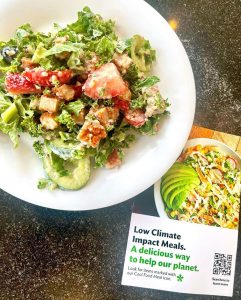
The dishes, which are marked by a distinctive green icon at the serving station, have a higher percentage of vegetables, legumes, and grains, which generally have a lower carbon footprint than those with beef, lamb, and dairy. According to the World Resources Institute—which Fordham partnered with on the Cool Food project—more than one-quarter of the world’s greenhouse emissions come from food production.
In March, the University went one step further by signing onto the New York City Mayor’s Office Plant-Powered Carbon Challenge. The pledge commits Fordham and Aramark to reduce our food-supply carbon emissions by a minimum of 25% by the year 2030.
Academics
This semester, a new one-credit, university-wide experiential learning seminar titled Common Home: Introduction to Sustainability and Environmental Justice was taught by faculty and staff from the Gabelli School, the Center for Community Engaged Learning, the Department of Facilities, the Department of Biology, and the Department of Theology.
Other sustainability-focused courses this semester include the City and Climate Change, the Physics of Climate Change, and You Are What You Eat: the Anthropology of Food (Arts and Sciences); Sustainable Reporting and Sustainable Fashion (Gabelli School of Business); and Energy Law and Climate Change Law and Policy (Law).
Did You Know?
Like most buildings in New York City, the ones on the Rose Hill campus get almost all of their power from power plants fueled by natural gas (along with some solar power). To power a building like Walsh Library, a natural gas-powered plant normally uses 37 million gallons of water annually. But fuel cells like the ones that were installed at the Walsh Library in 2019 actually make their own water, and as as result, Fordham is saving the community the equivalent of 57 Olympic-sized pools each year.
Students Take the Lead
At Fordham Law School, the student-run Environmental Law Review hosted a March 14 symposium that considered the impact of artificial intelligence on environmental law. Panels focused on how regulators and litigators can use AI and the challenge of addressing AI-generated climate misinformation.
In January, Fordham Law student Rachel Arone wrote The EPA Rejected Stricter Regulations for Factory Farm Water Pollution: What This Means, Where Things Stand, and What You Can Do for the Environmental Law Review. And the Law School’s student-faculty-staff collective Climate Law Equity Sustainability Initiative held a series of lunchtime discussions about climate change, law, and policy.
Student groups LC Environmental Club and Fashion for Philanthropy teamed up on March 8 to create reusable tote bags on International Women’s Day. The bags were donated to Womankind, which works with survivors of domestic/sexual violence and trafficking.
The United Student Government Sustainability Committee continues to run the Fordham Flea, a student-run thrift shop that connects students interested in selling old clothes with those looking to buy sustainably. The next flea will take place on April 26 from 11 a.m. to 2 p.m. outside of the McShane Center.
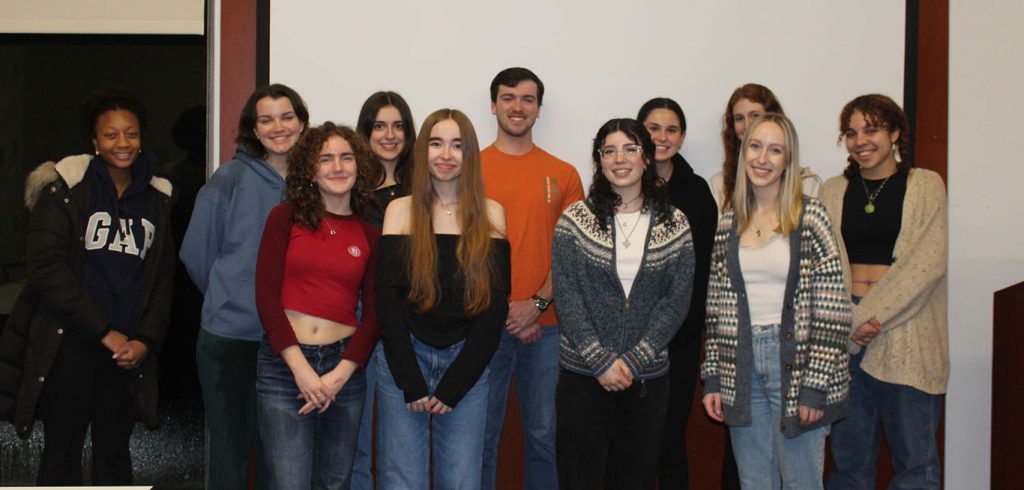
Community Engagement
The Center for Community Engaged Learning (CCEL) held an Urban Agriculture and Food Security Roundtable on Feb. 2. The gathering brought together community organizations and leaders from the Bronx to discuss urban agriculture and food security. Attended by Bronx Congressman Ritchie Torres, the meeting was also an opportunity for groups to learn about resources available from the USDA and the New York City Mayor’s Office on Urban Agriculture.
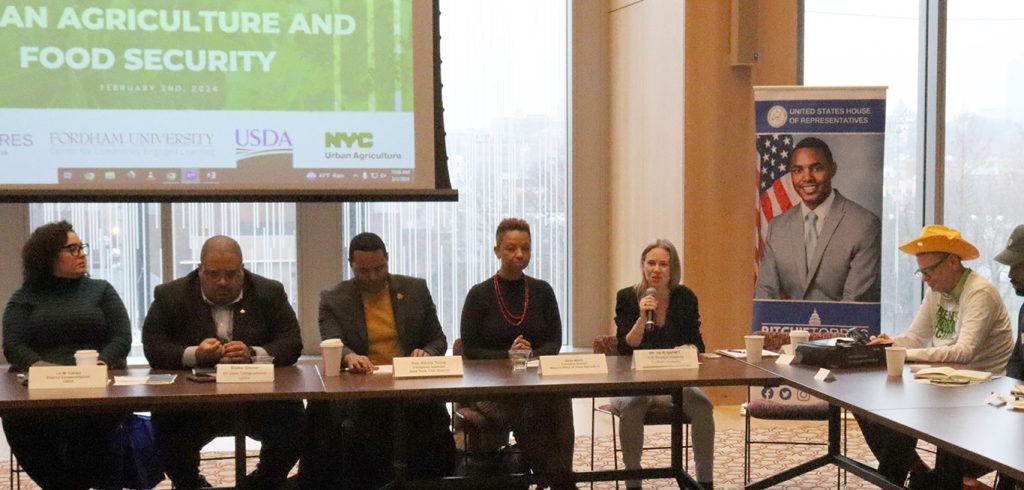
CCEL Director of Campus and Community Engagement Surey Miranda-Alarcon served as a panelist at a March 9 climate justice workshop at SOMOS 2024 in Albany, along with Mirtha Colon, GSS ’98, and Murad Awawdeh, PCS ’19.
Faculty News
David Gibson, director of the Center on Religion and Culture, and Julie Gafney, Ph.D., director of the Center for Community Engaged Learning, attended “Laudato Si’: Protecting Our Common Home, Building Our Common Church” conference at the University of San Diego on Feb. 22 and 23.
Marc Conte, Ph.D., professor of economics, and Steve Holler, Ph.D., associate professor of physics, presented their research around air quality, STEM education, and education outcomes on March 11 at the first night of Bronx Appreciation Week, which the Fordham Diversity Action Coalition organized.
Alumni
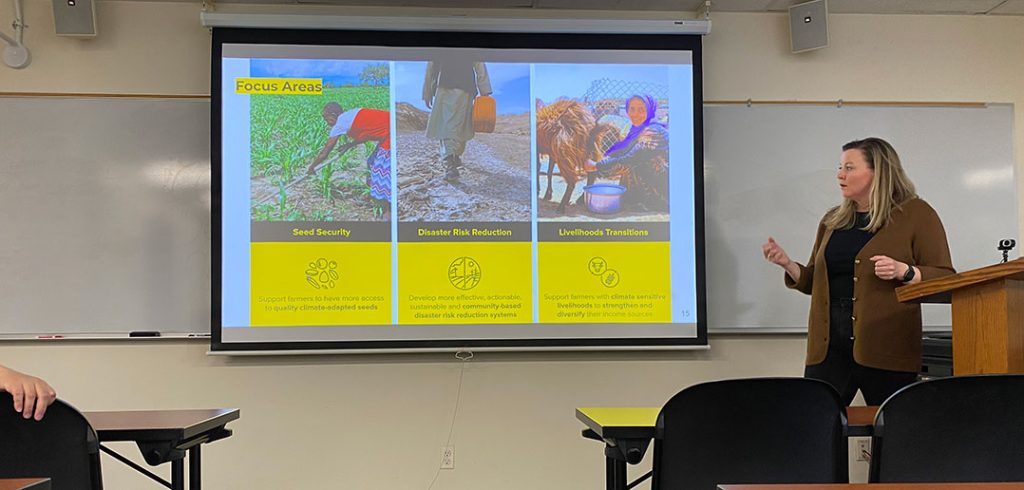
On March 14, Tara Clerkin, GSAS ’13, director of climate research and innovation at the International Rescue Committee, delivered a lecture at the Rose Hill campus titled “The Epicenter of Crisis: Climate and Conflict Driving Humanitarian Need and Displacement.”
In Case You Missed It
Here are some sustainability-related stories that you may have missed: In January, economics professor Marc Conte published the findings of a study that examined whether people living in areas with more air pollution suffer more from the coronavirus. The Gabelli School of Business partnered with Net Impact, a nonprofit organization for students and professionals interested in using business skills in support of social and environmental causes. A group of the Gabelli School Ignite Scholars traveled to the Carolina Textile District in Morgantown, North Carolina, to learn the benefits of sustainable and ethical manufacturing.
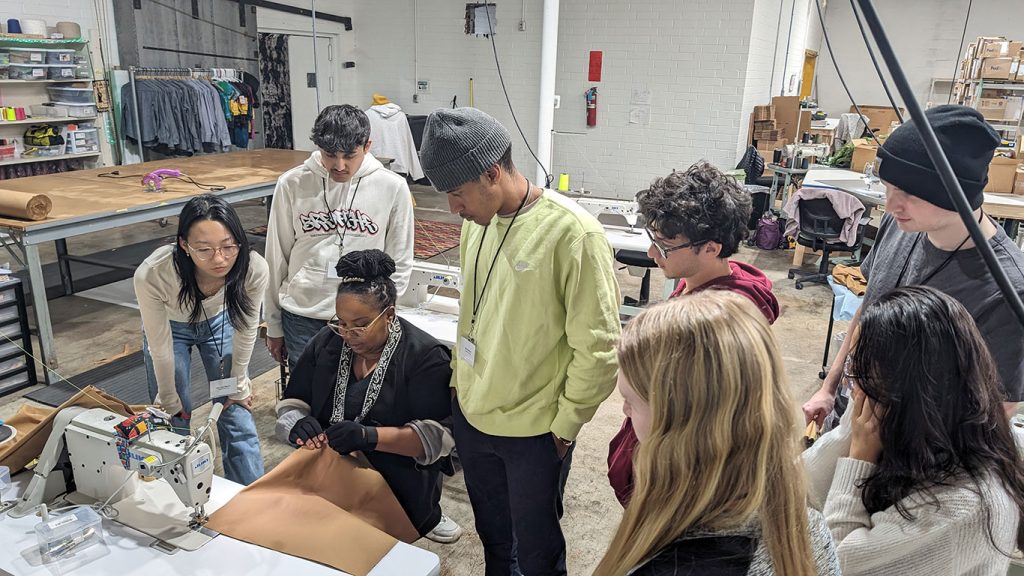
Upcoming Events
April 12 and 19
Poe Park Clean-up
In celebration of Earth Day on April 22, the Center for Community Engaged Learning is organizing visits to the park, where volunteers can help pull weeds and spread mulch. 10 a.m. – 2 p.m., 2640 Grand Concourse, the Bronx. Sign up here.
April 13
Bird Watching in Central Park
Law professor Howard Erichson will lead students on a birdwatching tour of Central Park, where they hope to spot and identify a few of the hundreds of species that pass through Fordham’s backyard on their annual migration routes. Meet at the Law School lobby at 9:30 a.m. Contact [email protected] to reserve a spot.
April 13
Ignatian Day of Service
Students and alumni will meet at the Lincoln Center campus and walk over to nearby Harborview Terrace, where they will build a community garden with residents. Lunch and a conversation about Ignatian leadership will follow. 10 a.m. – 2 p.m.
Click here to RSVP.
April 15
ASHRAE NY Climate Crisis Meeting
The theme of this meeting of the American Society of Heating, Refrigerating, and Air-Conditioning Engineers is “Challenge Accepted: Tackling the Climate Crisis.” All are welcome.
7 a.m.- 1 p.m., Lincoln Center Campus. Contact Nelida LaBate at [email protected] for more information or register here using code FordhamStudent2024.
We’d Love to Hear From You!
Do you have a sustainability-related event, development, or news item you’d like to share? Contact Patrick Verel at [email protected].
]]>Directed by serial entrepreneur and executive director Al Bartosic, GABELLI ’84, the Foundry also oversees the Fordham Angel Fund, which offers investments of up to $25,000 to the University’s active student and alumni founders.
Fordham Magazine caught up with a handful of alumni who received funding, coaching, or other support from the Foundry to find out where they—and their businesses—are now, and how they got there.
Mary Goode, FCRH ’20
Founder and CEO, Nantucket Magic
Fordham Degree: B.A. in Economics
The launch: I grew up on Nantucket Island and watched the tourist landscape change dramatically over the years, becoming increasingly popular yet harder to navigate. The company uses local expertise to offer hotel-like concierge service and amenities to vacationers in Nantucket, Massachusetts, and Palm Beach, Florida, including pre-arrival fridge stocking, dinner reservations, private chefs, backyard movie nights, beach picnics, wellness experiences, and more.
The challenge: Our biggest challenge has been navigating how to scale the business while maintaining exceptional service. To surmount this, we have recruited hospitality experts to work seasonally in both locations.
The assist: The Foundry has played a huge role in the success of my business! I learned so much during the process of the pitch competition alone. The actual funds I won helped us pay for marketing campaigns as well as expand our team, among other things.
The goal: I have been trying to broaden the definition of what success means to me. No matter what happens in the future, what I have created so far feels like an immense personal success, chiefly because of the incredible people I have worked with over the past three years.
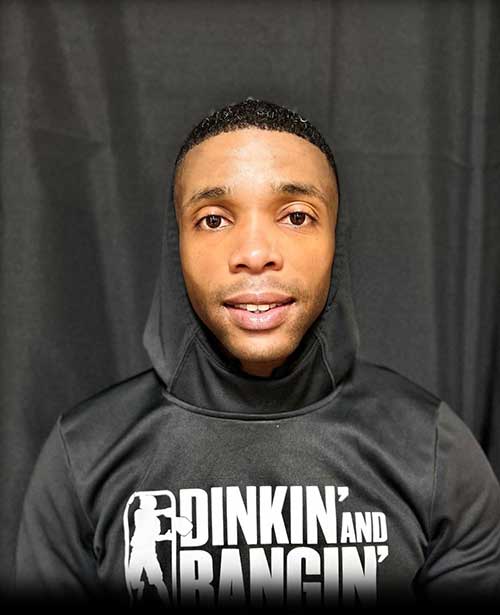
Marquice Pullen, GSE ’21
Co-Founder, DAB Pickleball
Fordham Degree: M.S.E., Curriculum and Teaching
The concept: DAB Pickleball is a one-stop shop for pickleball players worldwide. Comprehensive infrastructure, certified coaching tips, quality equipment, competitive prices. Events, tournaments, and a thriving community. Your ultimate pickleball resource. I can’t take credit for the idea. My business partner and brother, Antonio, stumbled upon the sport at Acworth Community Center in Georgia.
The process: We participated in three pitch challenges: Fordham Foundry Rams Den, Fordham vs. Bronx, and Black Ambition, all within one year, and were successful in all three, thanks be to God. Social media marketing, risk management, inventory management, tax filing, bookkeeping, and opening our first facility in July 2023 were all challenging aspects of the process. However, we found our momentum in late December 2023.
The foundation: Initially unfamiliar with Fordham University, my enrollment through the Army Civilian Schooling (ACS) program, driven by my aspiration to become an instructor at the United States Military Academy, inadvertently initiated our entrepreneurial journey. Rooted in Jesuit principles, my education at Fordham eventually led me to the Fordham Foundry. Without Fordham University as a catalyst, I might not have discovered the Foundry or ventured into entrepreneurship.
The win: Success is evident through our community of players and dedicated volunteers and supporters. Seeing the smiles on our consumers’ faces as they enjoy the game of pickleball and, more importantly, witnessing the competitive spirit of our elderly pickleball players, is a success story in itself.

Rachel Ceruti, GSAS ’20
Founder and CEO, Reclypt
Fordham Degree: M.A. in International Political Economy and Development
The vision: I kind of fell into the sustainable fashion scene in New York City and upcycling—when you or designers take something that was going to be thrown away and repurpose it, diverting textiles from landfills. I started a blog that transitioned into a marketplace for fashion, but our community told us they wanted to do the upcycling, not just buy it. We listened, and our mission is to use our platform to explore circular economy structures, with Reclypt as a hub that explores how we create change.
The challenges: Funding really comes to mind. You can’t rely on unfair wages and volunteers. Another challenge, too, is letting people know why circular fashion is needed and what it is.
The assist: I would go into the Foundry space and pop ideas off of the other entrepreneurs and the Foundry team. I benefited from the free office hours with a lawyer. The business aspects that are behind the scenes, I would have never been able to navigate without the Foundry.
The next step: We want to host consistent events; be able to grow and hire, including start monetizing my team’s time; gain more visibility; and establish a steady revenue stream.
Usman “Ozzy” Raza, PCS ’14, GABELLI ’21
Founder and CEO, Equepay
Fordham Degrees: B.A. in Economics, Executive M.B.A.
The concept: Equepay is at the forefront of simplifying billing and payment processing, not just in health care but extending our innovative solutions beyond. We aim to convert the complex financial operations in hospitals and clinics into streamlined, user-friendly processes, ensuring easy and efficient financial management for all involved.
The launch: Equepay was born out of discussions with friends in the health care sector who highlighted ongoing challenges with payment processing and collections. Recognizing the untapped potential in this underserved market, I founded Equepay. Since launch, Equepay has been expanding its solutions across various hospitals in the U.S.
The foundation: My EMBA from Fordham has been crucial in shaping my entrepreneurial journey. The knowledge and skills acquired laid a solid foundation for Equepay’s strategies and operational methodologies.
The goal: Success is an evolving target. Our immediate goal is to integrate our platform into 196 hospitals by the end of the year, continuously enhancing our services to meet the growing needs of the healthcare sector.
Emmit Flynn, FCRH ’21
Co-Founder, Awful Cloth
Fordham Degree: B.A. in English
The brand: We started Awful Cloth to be an online apparel company for street and lounge wear, with a lot of colorful designs and bright, vibrant ideas. All of them were hand-drawn original designs and I was the designer.
The launch: For eight or 10 months, it was all planning. We got all the domains, Twitter, and Instagram very early on before we had anything produced. That made all the difference when we finally did start to get traction. Then it was a lot of workshopping and pushing it out to our friends and family to see what the response was.
The hurdles: The true hurdles were things that are intangibles. It wasn’t “where do we find this factory” or “how do we do this.” Those things were small hurdles, but we were so driven that there was nothing like that that would stop us. It was more about the mental hurdles: having patience and confidence and being sure of ourselves. Especially early on when things were slow, and we weren’t making any sales, and we weren’t making any profit.
The win: We recently sold the business to a medium-sized retail group called Lilac Blond. We were very happy to do it because selling was a goal of ours and we knew these people—and we were sure that they wanted the best for the brand.
]]>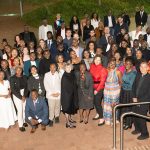
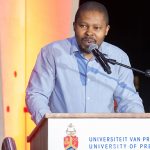
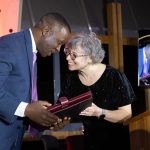
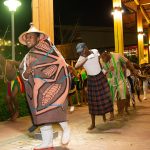
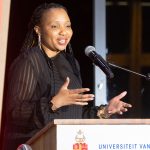
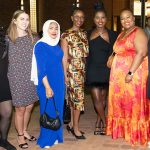
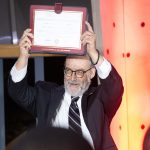
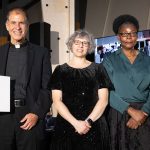 When Fouché Venter learned that the Emerging Markets program would be gathering for a 15th-anniversary celebration last summer in Pretoria, South Africa, there was “no question” in his mind that he would go.
When Fouché Venter learned that the Emerging Markets program would be gathering for a 15th-anniversary celebration last summer in Pretoria, South Africa, there was “no question” in his mind that he would go.
An alumnus of the program, he had traveled to the U.S. in the summer of 2010 with nine other South African students for six weeks, studying alongside students in Fordham’s graduate program in International Political and Economic Development (IPED), part of the Graduate School of Arts and Sciences (GSAS).
“There is something about having that program on my resume that I think has certainly made a difference and was a signal to potential employers,” said Venter, who is now an economics consultant in Pretoria and who joined the nearly 100 participants at an Aug. 19 celebration.
“Now that I’m doing the hiring, I tend to look twice to see if they did attend these sort of summer classes.”
The Emerging Markets program, which began in 2008 and continues today, is open to all IPED students and students from South Africa’s University of Pretoria. Students learn about monetary and fiscal policies and explore issues of economic partnership between South Africa and the United States.
In addition to classes, in both locations, they visit businesses as well as labor and government representatives. Each year, about 15 South African students visit New York in June, and an equal number of Fordham students visit South Africa in August.
When Venter’s cohort came to New York City in 2010, they attended classes on political risk analysis and finance and visited Washington D.C., Broadway, and the U.S. Stock Exchange.
A Promise Fulfilled
The Emerging Markets program originated with a conversation between Fordham President Emeritus Joseph McShane, S.J., and Nobel Laureate Archbishop Desmond Tutu, who visited Fordham in 2005 to accept an honorary doctorate.
Booi Themeli, Ph.D., a senior lecturer of economics and a native of South Africa, said Father McShane told him the archbishop had joked that in return for his visit, the University would have to do something for South Africans.
Three years later, the first cohort of Fordham students traveled to South Africa, and five years later, Venter’s cohort traveled to the U.S. To date, 208 Fordham students have visited South Africa, while 213 South African Students have visited Fordham.
Henry Schwalbenberg, Ph.D., director of the IPED program, said the goal was to create an opportunity for South Africans who traditionally weren’t part of the educational system to get an advanced degree.
“It really tied in with the end of Apartheid, the establishment of a wider democracy, and Fordham making a contribution to empowering the people who were left out,” he said.
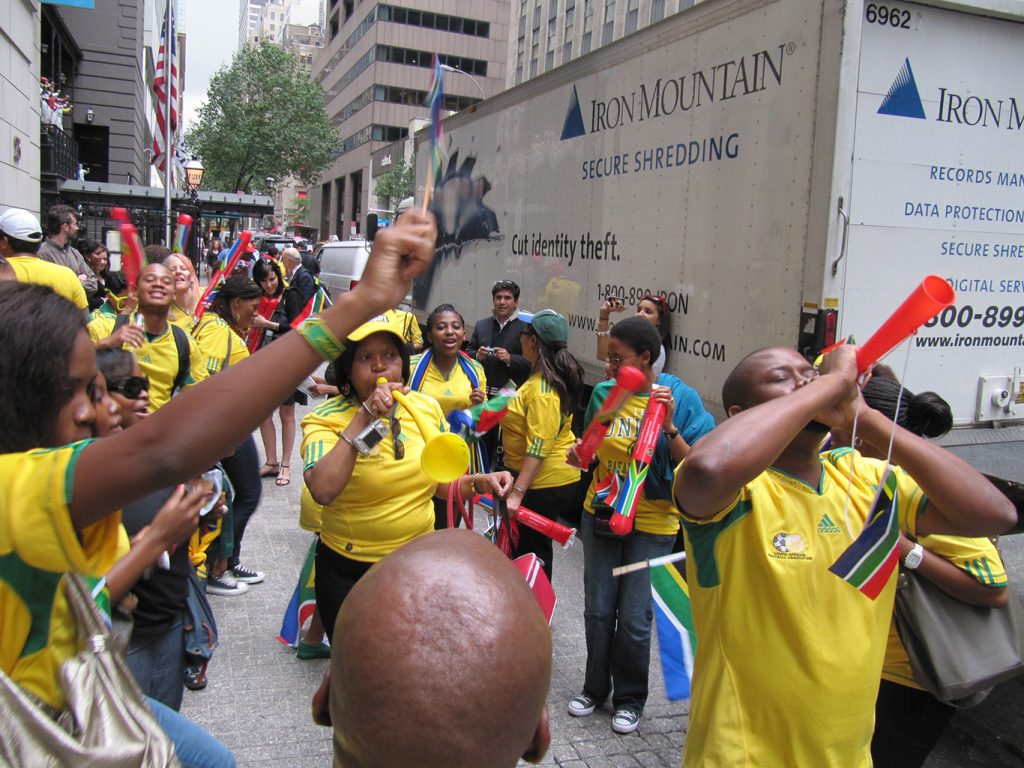
A Transatlantic Romance Blossoms
Elena Konopelko, GSAS ’13, came to the Bronx in 2011 from St. Petersburg, Russia, on a Fulbright scholarship to study with the IPED program.
She joined the Emerging Markets program and visited South Africa in the summer of 2012. There, she met Sokhana Caza, GSAS ’13, an alumnus of the program who was now a program assistant.
The following fall, he returned to the Rose Hill campus to earn an IPED master’s, and the two reunited. They married in 2016, and today, they share a home in Johannesburg with three children.
Konopelko said living in three different countries has opened her eyes to different approaches to business and academia.
“There are so many different options in how to conduct yourself professionally and how best to learn that you can make your own path forward,” she said.
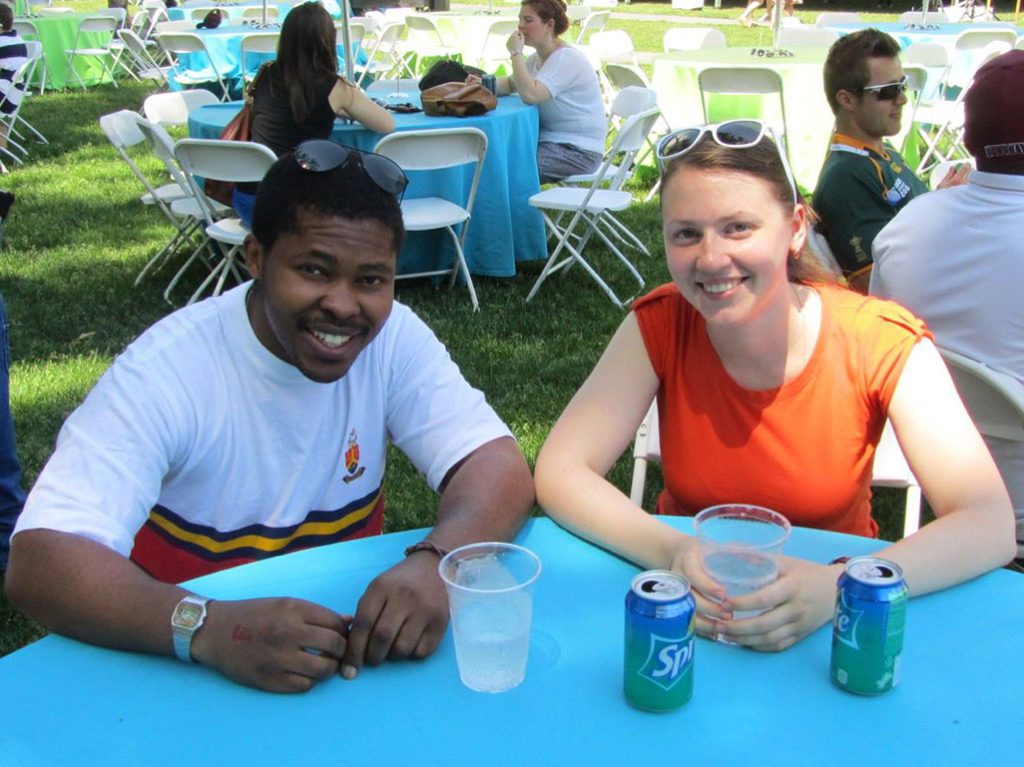
Fireflies and Real-World Lessons
Studying in New York City was life-changing for Caza. Times Square and the subway were new to him, but there were also smaller, unexpected moments—like seeing fireflies on a warm July evening at Rose Hill.
“I’d never seen them in my whole life. Just watching them at night, it was probably one of the most memorable moments of my time,” he said.
After nine years working for BP and Bloomberg, Caza now works for a financial technology firm affiliated with the Singapore Stock Exchange.
“The thing that I really liked when I got [to Fordham IPED]was that most of the professors had experience working for a corporate or financial institution,” he said.
“When they taught, it wasn’t all theory; it was always related to the real world.”
Changing Lives, Changing Families, Changing the World
Ann Gaylin, Ph.D., dean of the Graduate School of Arts and Sciences, said the August reunion was one of the most moving experiences she’s had in her career.
“There was such a sense of joy and energy in the students. It wasn’t just about changing lives but changing families and changing the world,” she said.
Margaret Chitiga-Mabugu, Ph.D., dean of the faculty of Economic and Management Sciences at the University of Pretoria, credited the program with creating global leaders.
“I have seen first-hand how the program enriches the student’s academic knowledge and provides a platform to interact with influential business leaders and policymakers,” she said.
“It not only benefits the students who participate; it has created opportunities for staff members at the University of Pretoria to enlarge their networks and has created prospects for future collaboration.”
Watch students from the 2023 cohort visit New York City last summer below:
“The laws exist,” said Giselle Schmitz, GSAS ’22, “but the economics really drive these races for resources.”
The conservation-minded researcher arrived in Bali, Indonesia, in August to work with the Coral Triangle Center, a nonprofit that connects governments, corporations, and local groups to help strengthen marine resource management in the region. Two big questions drive her work, she said: “How can a community be supported in the management of their own resources, and how can we reduce the outside stressors on those resources coming from countries that may have an exploitative interest?”
Schmitz was placed at the Coral Triangle Center after earning a Luce Scholarship, a prestigious award that gives early-career leaders an immersive professional experience in Asia. It marked the second fellowship she’s earned since graduating from Fordham’s international political economy and development (IPED) master’s degree program in 2022.
Finding a ‘Perfect Fit’ at Fordham
A California native and longtime scuba diver, Schmitz said protecting the oceans has always been a key part of her career goals. After majoring in English and minoring in biology at Walla Walla University in Washington, she earned a law degree at the University of Oregon, where she studied with Professor Richard Hildreth, who had been instrumental in passing several key environmental protections in the U.S.
After law school, she joined the Peace Corps to gain the kind of global experience she felt would be essential to environmental work, especially as rising sea levels and other effects of climate change permeate international borders. She was teaching at Gansu University of Political Science and Law in Lanzhou, China, in February 2020 when the COVID-19 outbreak cut short her time there.
That’s when Schmitz discovered the Fordham graduate program. She had been looking for a way to continue her global education in the U.S., and the IPED program was a “perfect fit,” she said, not only because it participates in the Paul D. Coverdell Fellows program, which provides financial assistant to returning Peace Corps volunteers, but also because it equips students—with classes like Econometrics and Development Economics—to work on complex issues in the face of competing interests.
Global Fellowships and Local Action
Schmitz said another highlight of her Fordham experience was working with the Office of Prestigious Fellowships, which helps students and alumni apply for funding and scholarships like the Fulbright and Truman. These prestigious fellowships allow them to pursue research and find innovative solutions to complex societal challenges, from marine resource management to subway accessibility.
With the support of the prestigious fellowships office—plus IPED program director Henry Schwalbenberg, Ph.D., and program manager Donna Odra—Schmitz applied for and earned a John A. Knauss Marine Policy Fellowship in 2022, the year she completed the Fordham program. She worked in the Office of Science and Technology at the National Oceanic and Atmospheric Administration (NOAA), part of the U.S. Department of Commerce. For a year, she studied how community-based research can help the government manage fisheries “in a way that makes sense for the ecosystem, including the [people] that depend on it.”
And while her research has brought her across the world to promote sustainable development, Schmitz believes that we can all find inspiration and take action closer to home.
“Finding those pieces to continue to be inspired by is so important, because otherwise, climate looks like a monumental challenge,” Schmitz said. “I think keeping hope active comes from those small actions, those tangible steps you can take.”

“Always being available comes at the price of never being free,” Cardinal Parolin said in his dinner speech. “In reality, the digital space, which potentially is the world of unlimited connections and interactions, is a lonely place.”
The Pro Pontifice Dinner, co-sponsored by Fordham and CAPP-USA—the U.S. affiliate of a Vatican foundation—is a longtime tradition that celebrates Catholic social teaching. This year’s dinner was held on Sept. 23 at the New York Athletic Club in Manhattan. In attendance were nearly 100 alumni, administrators, staff, faculty, and friends of Fordham.
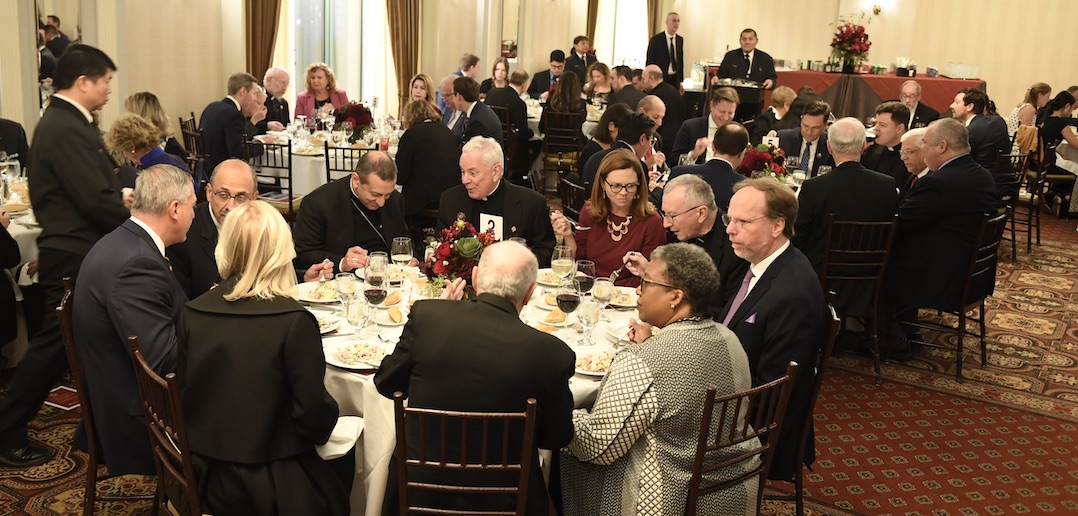
President Tetlow: ‘We Are So Proud to Be Part of a Global Church’
From a podium at the front of the President’s Room, Tetlow warmly welcomed Cardinal Parolin, the Vatican’s secretary of state, who was in town to address world leaders at the U.N. General Assembly.
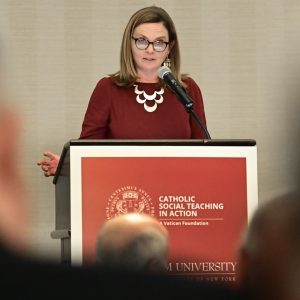
“This week, you chose to use your voice to talk about the power of education, and particularly the Catholic model of education. So you will not be surprised that the people in this room agree with you on that subject,” she said, to chuckles from the audience.
Fordham is a place that not only teaches the fundamental principles of the Catholic faith, but also puts its teachings into action, said Tetlow. In an increasingly secular world, it has become more difficult to draw students back to the Catholic faith, she said. But Fordham continues to rebuild trust with the church and its mission—and does not lose sight of what it means to be one of the premier Catholic universities in the world.
“We are so proud to be part of a global church, to have the privilege and responsibility of operating on a world stage with responsibilities far beyond our borders,” Tetlow said.
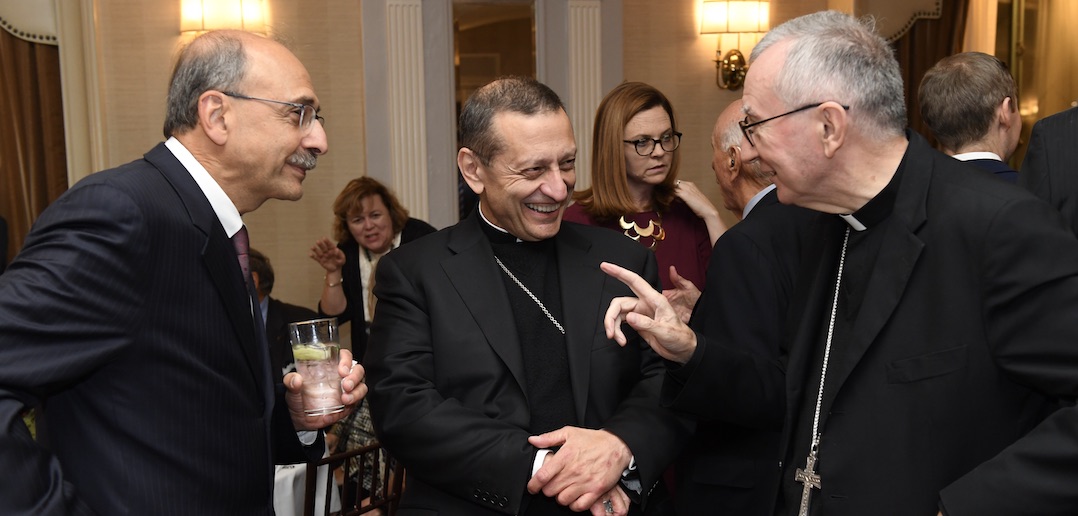
Cardinal Parolin, a Longtime Friend of Fordham
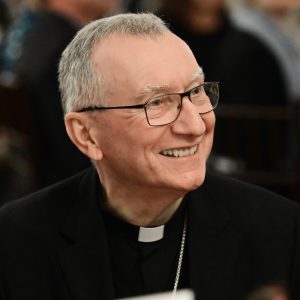
In return, Cardinal Parolin expressed his gratitude to Fordham, particularly to the students in the Graduate Program in International Political Economy and Development who have supported the work of the Holy See through internships under the Permanent Observer of the Holy See to the United Nations, Archbishop Gabriele Caccia.
Cardinal Parolin is a longtime friend of Fordham. In 2014, he participated in his first Pro Pontifice Dinner. In 2019, he visited the Lincoln Center campus, where he learned about Fordham’s Pope Francis Global Poverty Index. Most recently, Cardinal Parolin and President Tetlow met in person for the first time during a summer pilgrimage to Rome, where the cardinal initiated a partnership between Fordham and Villa Nazareth, a Vatican-affiliated residential college in Rome that provides free education to talented students.
A Message from the Vatican: The Dangers of the Digital Space
In his dinner address, the cardinal offered a message about smartphones: devices that have not only revolutionized the ways that we interact with the world, but also created an unhealthy dependency, he said.
“Being constantly online leaves human beings in a perpetual state of agitation, clicking and swiping on a virtual journey to nowhere,” said Cardinal Parolin. “Paradoxically, being too connected leads to social isolation, which in turn can cause a range of spiritual and mental challenges, including depression.”
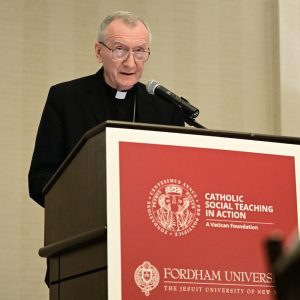
Being separated from your phone can actually be liberating, he said.
“Cardinal Collins, Archbishop of Toronto, was telling me that students who enter the propaedeutic year of his archdiocesan seminary are obliged to forgo the use of a smartphone for a period of one year,” Cardinal Parolin recalled. “At the outset, the seminarians are traumatized, wondering how they will survive for so long without this vital tool. At the end of the year, however, they are all most grateful for the experience of liberation, recognizing that it was not they who had been using the smartphones, but rather, vice versa—the smartphones had been using them.”
Pope Francis himself has spoken on this issue multiple times, said the cardinal. The best solution is to balance the costs and benefits of smartphone use, he said.
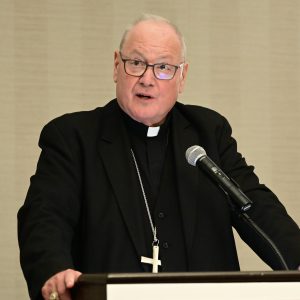
“In brief, we need to ensure that our engagement with digital technology takes place in an informed, wise, and balanced manner, cognizant of both the benefits of connectivity, and the dangers its disordered use poses,” the cardinal concluded.
Throughout the dinner, guests mingled over a three-course meal—boneless short rib, bleu cheese salad, and red jacket apple tart—and listened to a suite of musical performances from several artists, including the New Bel Canto Trio. At the end of the evening, President of CAPP-USA Frederick Fakharzadeh emphasized the significance of the Pro Pontifical Dinner.
“As we bring this evening to a close, I would like to echo what has become a clear theme of this evening: a celebration of past gatherings and a celebration of tonight’s return to such events … in which we salute the strong ties between the Holy See and the Catholic community, locally and globally,” said Fakharzadeh. “The mission of promoting Catholic social teaching takes a community—global, national, and international—and tonight, we come together from all over the world to honor this sacred charge.”
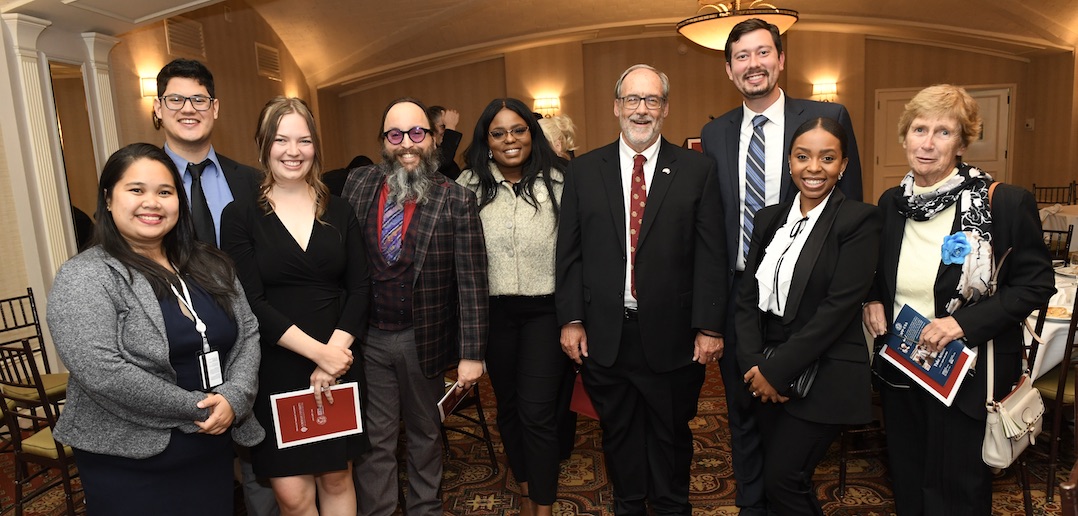
For Priya Ravindran, who met her Ukrainian husband at Fordham and later adopted his country as her own, reporting on the war and sharing her young family’s story is an act of resistance.
When Russian president Vladimir Putin ordered a full-scale invasion of Ukraine in February, Priya Ravindran was living in Kyiv with her Ukrainian husband and their 2-year-old son, Neil. The couple met in 2010 as graduate students at Fordham and were married in Kyiv four years later.
“We led fairly normal lives. We worked, traveled within Ukraine and internationally, went out on the weekends, went out to eat, met with friends,” said Ravindran, who was an editor at the Ukrainian state-run news station UATV English before going on maternity leave in 2019. “It wasn’t until February 24 that our lives changed forever.”
Two days later, amid reports of military and civilian casualties near Kyiv, they fled, joining more than 12 million people who would leave their homes following the Russian invasion.
‘Trying to Play My Part’
As they drove away, “Alex asked me in the car, ‘Do you realize you are now officially a mother fleeing war with an almost-3-year-old?’” Ravindran wrote on February 26.

“We always knew this was a possibility. Even before I got pregnant, I asked Alex many times, ‘What if we have a child and full-out war breaks out?’ … Like with everything in life, you try to put those thoughts at the back of your mind, but here we are.”
They headed west with a friend and his mom, driving through numerous Ukrainian military checkpoints. “We are surrounded by the Carpathian Mountains, vast snow-covered fields, and heaps and heaps of trees with just the perfect amount of snow,” she wrote. “Seeing the pristine beauty of nature, I almost think to myself, ‘This is all a dream, right? It has to be.’ But no, this isn’t a dream. … Ukraine is still fighting for its existence.”
On February 28, they arrived at their destination: a friend’s home in Ivano-Frankivsk.
“I have a lot of guilt that I’m not doing enough, not helping enough,” Ravindran wrote that day. “But I’m trying to play my part in letting people know what’s happening, as best as I can, in the best way I know how: through my love of writing.”
Since late February, Ravindran has been posting daily accounts of the war. In each post on her public Facebook page, she typically mixes news and analysis with a firsthand account by another writer as well as personal stories of her family’s experiences and emotions. (To protect her husband’s identity, she uses the pseudonym Alex to refer to him.)
Her posts have reached a broad audience. On March 3, one day before Neil’s third birthday, she was interviewed by Indian TV journalist Barkha Dutt, “whose reporting in the 1990s on the India-Pakistan war convinced me as a 12-year-old to be a journalist,” Ravindran wrote.
From Mumbai to Kyiv via Rose Hill
Born in Mumbai, Ravindran was 17 years old when she moved from India to the U.S. to attend college. After earning a bachelor’s degree in journalism and international relations at the State University of New York at Oswego, she enrolled at Fordham to pursue a master’s degree in political science.
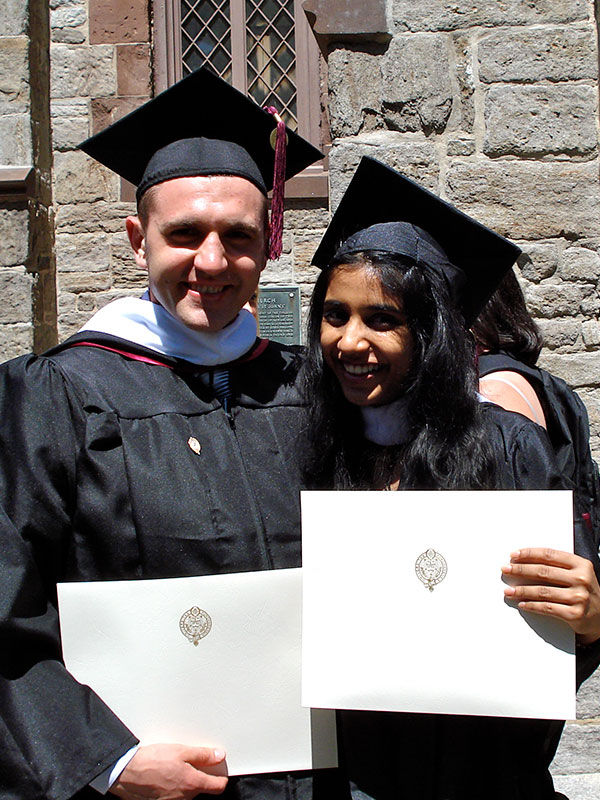
The day before her classes started in fall 2010, she left her walk-up apartment on Arthur Avenue to buy groceries. “When I returned, I was holding the door to the building open with one leg while pushing all my bags in,” she said. “At the same time, Alex exited his apartment on the first floor, stopped, and asked me if I needed help. I told him I could manage, but he insisted, so he carried all my bags upstairs and started to run away. I screamed ‘Priya!’ after him, and he said, ‘Alex!’”
Alex had arrived at Fordham on a Fulbright Fellowship, and he was enrolled in Fordham’s International Political Economy and Development program. The two saw each other in class the next day, Ravindran said, but it wasn’t until the end of the semester that she learned that they share a love of trance music. “I invited him and his roommates to a concert by a famous German duo,” she said. “He asked me out the next day, and the rest is history, as they say.” They were married in Kyiv on June 26, 2014.
A Rousing Song for the Motherland
In her daily posts on Facebook, Ravindran has covered numerous aspects of the war. In early July, she published transcripts of phone conversations intercepted by the Ukrainian Security Service in which Russian soldiers discuss the killing of civilians. In mid-May, she shared the results of a Kyiv School of Economics study indicating that, as of May 10, the war had caused an estimated $600 billion in economic losses in the country. And in June, she covered a nightly address by Ukrainian president Volodymyr Zelenskyy in which he said that at least 828 children had been affected by the war—446 injured, 243 killed, and 139 missing.
“We talk about war and its impact in numbers, and as jarring as they may be,” Ravindran wrote, “they don’t always convey the full story. … They don’t tell us about the trauma parents and their children are dealing with. We remember so many wars in numbers, but we forget about the stories.”
Amid the fear and anxiety of the war, and the near-constant threat of air raids, she has found moments to celebrate: the “happiness on Neil’s face” when he gets a couple of “siren-free” hours to play in a local park, for example, and the “immense joy” of seeing the Ukrainian rap and folk band Kalush Orchestra win the annual Eurovision Song Contest in mid-May.
“It doesn’t mean anything for the war,” she wrote at the time, “but it was a small relief for the psyche.” She noted that the band’s lead singer, Oleh Psiuk, wrote the winning song, “Stefania,” as an ode to his own mother. But since the Russian invasion, the song has taken on new meaning.
“People have been using the song to symbolize Ukraine—the yearning of children who have been separated from their mothers because they are serving in the military; the emotions of sons who are missing their mothers who crossed the border to bring their other siblings to safety; the pain of children who have lost their mothers to the war,” Ravindran wrote.
And with lyrics like, “I’ll always find my way home, even if all roads are destroyed,” she added: “Some are reminded of the motherland itself.”
Read Priya Ravindran’s Ukraine war journal on Facebook at @pravindran1.
]]>
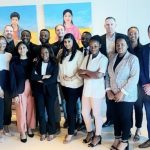
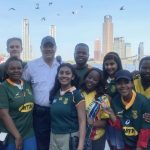 For more than a decade, graduate students from the University of Pretoria have studied in a Fordham summer exchange program that teaches them about American corporate life in one of the most iconic cities in the world. The annual experience, which is co-led by Fordham’s International Political Economy and Development program, went virtual for two years during the pandemic. This June, the South African students returned to the Rose Hill campus.
For more than a decade, graduate students from the University of Pretoria have studied in a Fordham summer exchange program that teaches them about American corporate life in one of the most iconic cities in the world. The annual experience, which is co-led by Fordham’s International Political Economy and Development program, went virtual for two years during the pandemic. This June, the South African students returned to the Rose Hill campus.
Fifteen students, alumni, and friends of the University of Pretoria lived at the Rose Hill campus for five weeks. In the evening, they took business classes taught by Fordham faculty. During the day, they visited prestigious companies in guided tours led by Fordham alumni who now work at those companies, including Jason Caldwell, GABELLI ’10,’17, GSAS ’11, who serves as a vice president of private wealth management at Goldman Sachs; Darlene Checo-Nuñez, FCRH ’17, an account manager at Bloomberg LP; and Brian Joyce, GABELLI ’98, a managing director at Nasdaq.
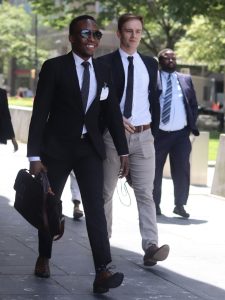
“This program far transcends the traditional classroom pedagogy,” Vusi Maupa, a 33-year-old senior policy analyst at the National Treasury of South Africa, wrote in an email. “We had immeasurable privileges of interacting with senior executives and gained tremendous insight into [their work].”
Maupa, who graduated from the University of Pretoria with his bachelor’s and master’s degrees, said that he participated in the exchange program to learn how to manage financial and economic risks and opportunities in his country and beyond. He said those lessons will help him at his job, where he works in the fiscal policy unit.
“Before the program, I had limited knowledge of strategic financial management and political risk analysis. I am now confident with my understanding and knowledge of these subjects. I will be using the knowledge and skills gained in my professional work,” said Maupa.
Yuvana Jaichand, a 22-year-old graduate student who is studying econometrics, said that the most interesting part of the program was visiting top companies in the business sector.
“It is interesting to see how they manage to maneuver through challenges and how they come up with various creative solutions to market gaps,” she wrote in an email. “It was surprising to see how big firms/companies don’t have it figured out all the time and how they learn as they progress.”
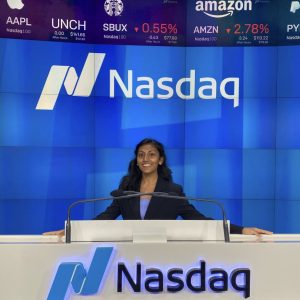
Jaichand, who never visited the U.S. before this summer, said that the program has expanded her perspective on the world.
“I saw this program as an opportunity to experience the world in a new light and to broaden my knowledge beyond an academic environment,” said Jaichand, who is working toward becoming an econometrician or data scientist. “Fordham has provided the opportunity to experience New York, which is known by many as the financial hub of the world, firsthand.”
Besides learning about the American business world, the South African students used their first trip to the United States to explore New York City.
Booi Themeli, Ph.D., director of the exchange program and an associate professor of economics at Fordham, said they were invited to watch the annual Macy’s Fourth of July fireworks show by Gregory Stewart, a deputy inspector for the New York City Police Department.
Shortly before the show began, they met the mayor of New York City, Eric Adams. They also saw The Lion King on Broadway, where original cast member Ron Kunene, a friend of Themeli’s, introduced them to some of the main performers, including the actor who plays Mufasa. In addition, the students visited Boston for a weekend, where they toured Harvard, Massachusetts Institute of Technology, and Boston College.
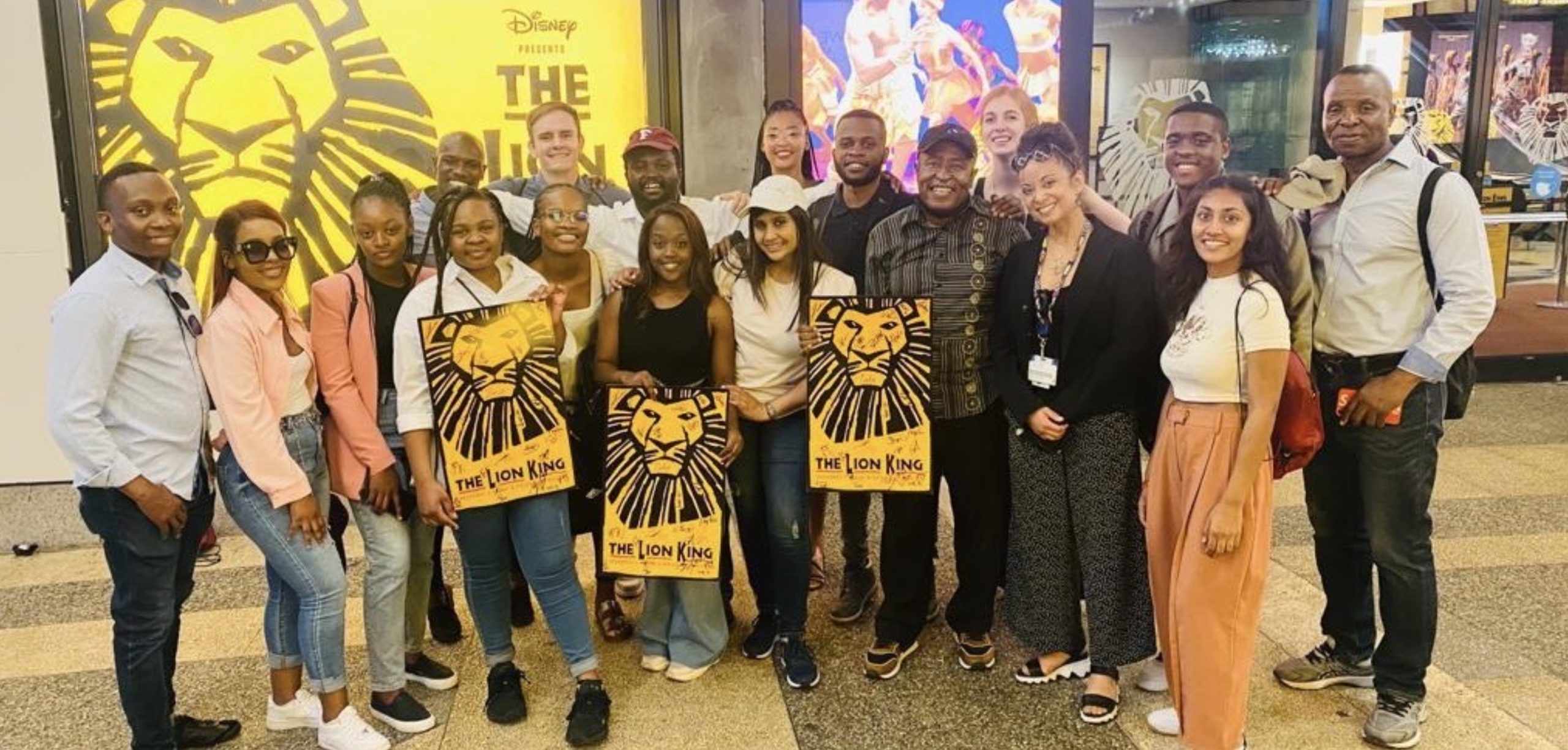
The Fordham-University of Pretoria student exchange program was launched in 2007 by the Most Reverend Desmond Mpilo Tutu—archbishop emeritus of the Church of the Province of Southern Africa and a 1984 Nobel Peace Prize recipient who was awarded an honorary doctorate from Fordham in 2005—who aimed to empower the next generation of leaders, said Themeli.
During past visits, graduate students from South Africa have taken classes at several Fordham schools, such as the Graduate School of Arts and Sciences and the Graduate School of Social Service, and participated in on-campus festivities like the annual Dagger John Day pie-eating contest. Outside the classroom, the students have met people who run world-famous companies and gained a firsthand look at the American way of doing business. The partnership between Fordham and the University of Pretoria has also expanded to include the Ubuntu program, a semester-long student exchange program for undergraduates.
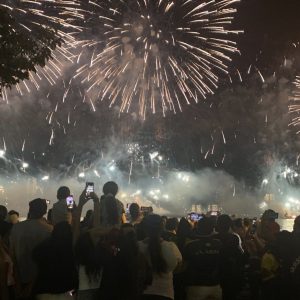
In turn, Fordham graduate students have studied in South Africa, where they engaged with foreign political advisers and policymakers and conducted data analyses with students from across the world. In addition, they attended social events where they met a former South African first lady and CEOs of major banks in South Africa. In August, 12 IPED students will visit the University of Pretoria and take business classes with some of the same students who visited Fordham this summer.
“This program represents one of the focal points of Fordham’s internationalization efforts,” Themeli wrote in an email. “It continues to provide opportunities to South African and Fordham students to study in South Africa and the U.S, thus enabling them to gain an understanding of other cultures that are important in their chosen fields of study. In addition, the program is in line with Fordham’s mission to contribute to economic development and social transformation of South Africa and the rest of the African continent.”
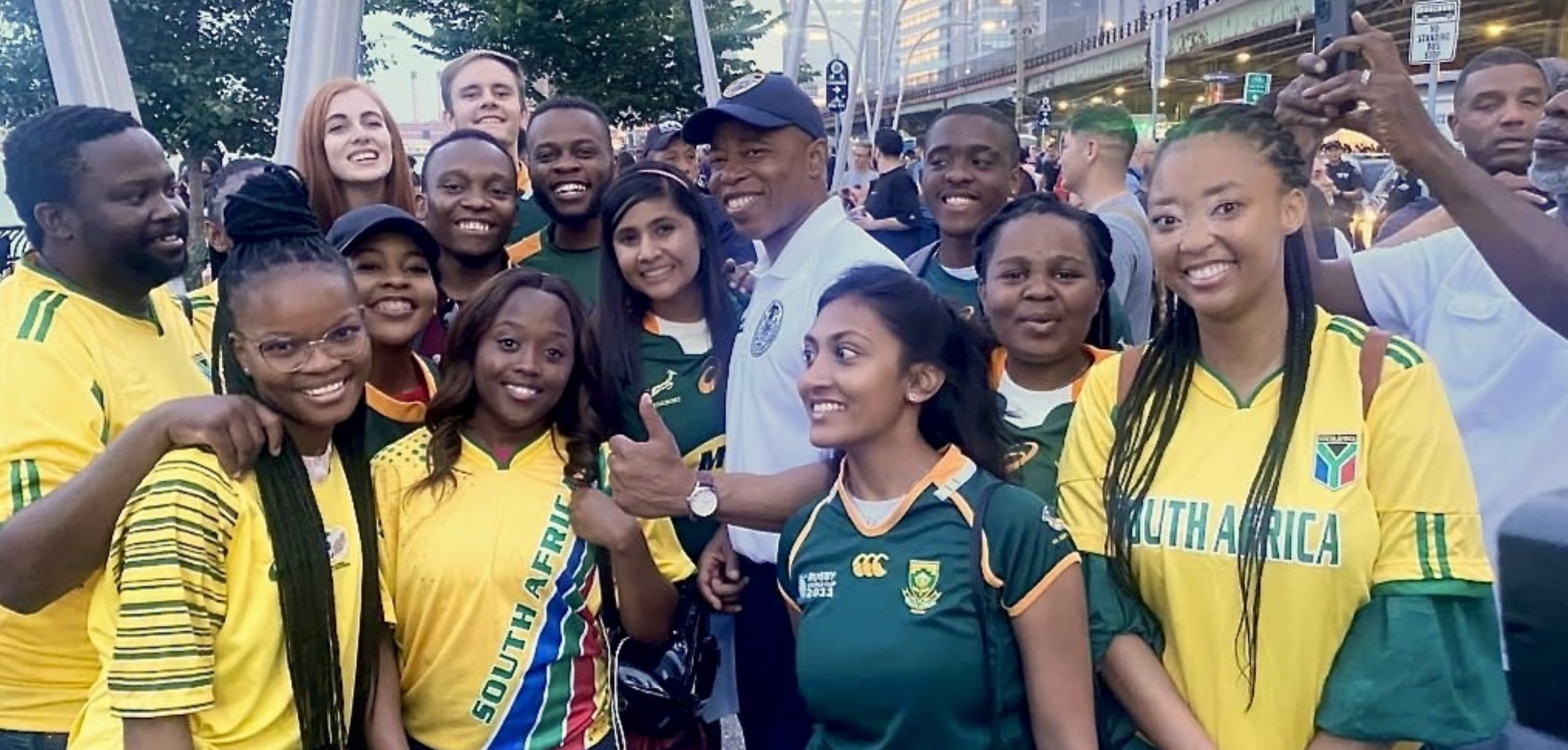
“We Fordham students have a privilege and also a responsibility to work with community-based organizations to help make the Bronx a better place—and that’s true of any community you live in,” said Medeiros.
Nutrition and Affordable Housing for Families
When Ellie Bauer walks across the commencement stage this spring, she’ll have earned two master’s degrees: one in economics and another in international political economy and development (IPED).
In 2020, she entered Fordham as a Peace Corps Coverdell Fellow, a fellowship for recently returned Peace Corps volunteers. She had volunteered in Ethiopia, where she taught nutrition classes to middle school students and helped families reach their nutritional goals. As part of her fellowship at Fordham, she served as a volunteer coordinator at the University Neighborhood Housing Program (UNHP), a nonprofit that creates and improves affordable housing for residents in the Northwest Bronx. Over the past two years, she managed volunteers and interns and helped clients complete their affordable housing applications. She also worked with a team to implement a new virtual tax assistance program for low-income residents.
“I grew up in a town of 2,000 people, where we all knew each other and shared a certain culture. Moving somewhere for a job or school provides you with a different community to live with, and it’s important to learn more about that community,” Bauer said.
Thanks to her Presidential Management Fellowship—a program that matches outstanding graduate students with federal opportunities—she will move to Chicago and become a program specialist in the U.S. Department of Agriculture’s Food and Nutrition Service, where she will support WIC, a supplemental nutrition program for low- to middle-income families.
Bauer said she is grateful for her mentors in Fordham’s IPED program, who ensured that Bauer and her classmates got to know each other during the pandemic and secured funding for their unpaid internships and language training.
“I feel very lucky to have found the IPED program and the directors who make it so great,” she said.
Listening to Men Experiencing Homelessness
Benjamin Medeiros is graduating with a bachelor’s degree in psychology from Fordham College at Rose Hill. In his first year at Fordham, he tutored elementary students and tended to a community garden in the Bronx. Over the past year, he has worked to dismantle stereotypes about the homeless population with his classmates through Fordham’s Engaged Leaders Fellowship, offered by the Center for Community Engaged Learning. His team interviewed men living at a Manhattan shelter about their lives and surveyed more than 100 Fordham students about their perceptions of the homeless community.
At the end of May, he will fly to Mississippi through Global Outreach, a Fordham service and cultural immersion program. For one week, Medeiros will serve as a counselor at a sleepaway camp for foster children from low-income backgrounds. This fall, he will return to Fordham to pursue his Ph.D. in counseling psychology.
“Being a counseling psychologist is essentially being a community-engaged learner. You interact with a community and learn from the people that you work with,” said Medeiros, who hopes to someday counsel clients at a correctional facility in New York.
“My experiences at Fordham have taught me how to appreciate the people in the larger community, especially in marginalized corners of that community,” said Medeiros, “and how to use my skill set and voice to make that community better.”
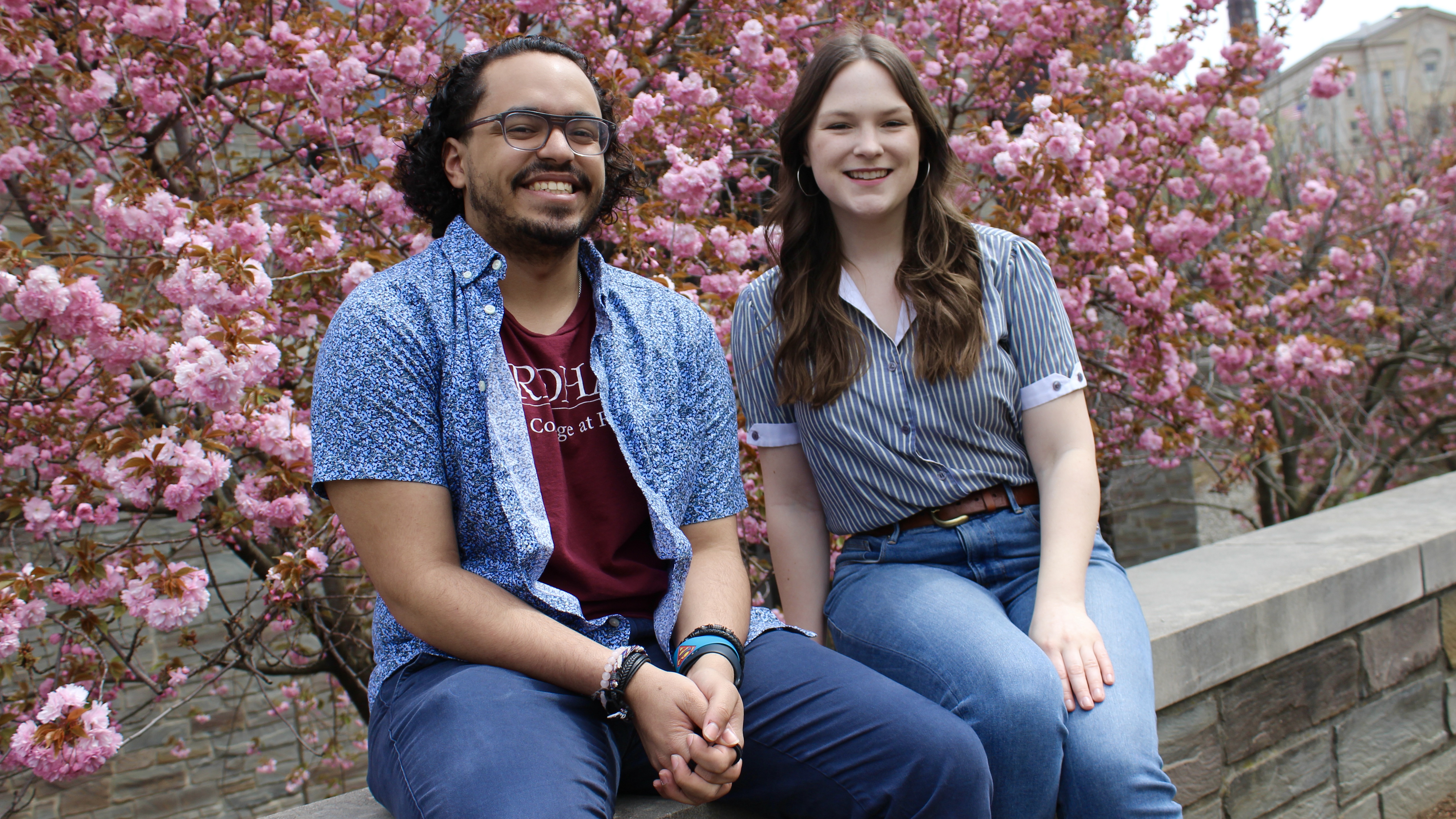
Selwin Hart, special adviser to the secretary-general on climate action and assistant secretary-general for the Climate Action Team at the United Nations, addressed students and staff about the recent developments in climate negotiations at the 2021 UN Climate Change Conference (COP 26) held in Glasgow from Oct. 31 to Nov. 12 of this year.
Hart, a 2000 graduate of the Fordham IPED program, offered his thoughts on how the world must act in the face of the pandemic recovery and worsening climate crisis.
“Geopolitical tensions point to confrontation, competition, and potential conflict at a time when collaboration, cooperation, and solidarity are needed more than ever to ensure an inclusive recovery and to address the climate crisis,” he said.
Hart was the Cassamarca Lecturer at the “Climate Change and UN Call to Action” event delivered in Tognino Hall. The event was hosted by Fordham’s Graduate Program in International Political Economy and Development (IPED) and co-sponsored by Fordham Students for Environmental Awareness and Justice.
Hart said that at the Glasgow climate negotiations—the most consequential climate negotiations since the Paris Agreement was signed in 2015—efforts were made to create multilateral agreements focused on addressing key issues concerning climate change.
The first goal from the conference was to keep the 1.5°C of warming goal within reach, which is the warming threshold agreed upon by most climate experts needed to avoid catastrophic damages from climate change. In other words, the world needs to limit greenhouse gas emissions such as carbon dioxide—the cause of rising temperatures—in order to limit the rise in Earth’s temperature to only 1.5 °C.
“The 1.5 °C goal is alive, but it is on life support, it will depend on what happens this decade, and more importantly in the next two to three years,” he said,
The second goal was to have developed countries deliver on their commitment to supporting emerging economies with $100 billion in climate financing, which Hart said should be completed by 2023. The third and final goal was to develop support for countries that are already facing climate impacts. An agreement was made on this front to double climate adaptation funding by 2025.
Hart said that the U.S. and China issued a joint statement at the conference committing to work together on climate-related actions, which he noted is substantial given the current geopolitical tensions.
Hart remains optimistic about the progress made at the negotiations, but he knows that challenges lie ahead.
“Multilateralism is at a crossroads; for multilateralism to be effective it needs the support and leadership of the largest players like the U.S. and China, but the voices of the smallest players in the international community also must be heard. It is imperative that they are heard and not sacrificed.”
Coming from the small island nation of Barbados, Hart has a unique perspective on these issues. He explained the triumph of the small island states, who, with the U.N., were part of initial the coalition to push for the 1.5 °C warming goal, and through the tools and levers of multilateralism, were able to successfully advocate and advance it.
Hart gave his warm appreciation to IPED Director Henry Schwalbenberg, Ph.D., who, over 20 years ago, offered Hart a fellowship to study at Fordham, which he says launched his career. Since then, Hart has been a chief climate change negotiator for Barbados as well as the ambassador of Barbados to the United States, prior to being appointed to his current U.N. position.
To bring the discussion closer to home, Marc Conte, Ph.D., of the Fordham Department of Economics delivered remarks on climate and climate action within the United States. He highlighted the importance of information in future actions and argued that if we do not have the correct information, or if real estate and other commodities are not indicative of perfect information, we will not be able to treat the climate crisis with the urgency it deserves. He pointed to the example of multimillion-dollar properties still being sold on Florida waterfronts, even with the threat of sea-level rise.
He also connected the issue to health.
“If we had more information about these benefits and costs to society of adverse health outcomes, we might be more willing to contribute and collaborate,” he said, adding that the U.S. can and should be a global leader in climate, as it has been the biggest cumulative emitter of greenhouse gases throughout history.
In closing, Hart connected the discussion on multilateralism with climate action by saying we should “try hard at all times to understand, in the true Fordham style, the perspectives and views of those that are across the table. There is always hope for finding common ground.” He emphasized that while progress is incremental, he still believes we can solve the climate crisis.
–Kevin Strohm
]]>
“Economists are usually more concerned with money, wealth, and income, not so much with health. But health should come before money,” Deaton said at the Lincoln Center campus on Sept. 24—his first “non-Zoom” presentation in 18 months. “Money and health means very little if you’re not alive to enjoy it.”
Deaton was the keynote speaker at the fourth event of the biennial conference “The Health of Nations: Pope Francis’ Call for Inclusion,” co-hosted by Fordham’s Graduate Program in International Political Economy and Development (IPED) and the U.S. affiliate of the Vatican foundation Centesimus Annus Pro Pontifice. The goal of the conference is to bring together international experts to address poverty and development issues raised by Pope Francis through the lens of Catholic social teaching. Deaton was joined by several speakers, including Frank J. Caggiano, bishop of the Catholic Diocese of Bridgeport, Connecticut, and award-winning economist and University of Notre Dame professor Joseph P. Kaboski for a moderated discussion.
Deaton’s work is a critical part of Fordham’s IPED curriculum, said Henry Schwalbenberg, Ph.D., program director and associate professor of economics.
“His work on measuring poverty guides our stuents in preparing our annual publication of Fordham’s Pope Francis’ global poverty index, and his writing on deaths in the tropics is at the core of how we teach our students about public health issues in the developing world,” Schwalbenberg said at the conference. “Because of Professor Deaton’s exceptional writings as well as the outstanding professional field experiences provided by Catholic Relief Services, our students are that much more prepared to understand and contribute to international efforts to reduce—hopefully, reduce—global poverty.”
Many global health inequalities are driven by low infant and child mortality rates in poor countries, said Deaton. The U.S. can help them by requesting that organizations like the National Institutes of Health research more diseases that greatly impact poorer countries, he said. The U.S. government can also increase the distribution of global public goods, like the Pfizer-BioNTech and Moderna COVID-19 vaccines, to countries that desperately need them. In addition, the U.S. can reduce arms sales, he said.
“America makes huge amounts of money through exporting arms. I don’t know what we think we’re doing when we’re sending aid to countries at the same time we’re selling arms to them,” Deaton said. “When my students come to me and say, ‘What should we do to help people in poor countries?’ … I say, ‘The country you should go to is Washington, D.C. and you should tell people to stop harming people in poor countries.’ We can do a tremendous amount of that without actually going there and pretending to help or trying to help.”
What doesn’t work very well, he said, is transferring monetary funds from rich to poor countries, what we commonly view as “aid.” What those countries need more than money is an “internal social contract” between the government and its people, he said.
“We complain about our government, but we mostly pay our taxes … and in exchange, they give us all these things—police, defense, roads, laws, health, pensions and education—and that’s because we’re organized in a way that in exchange for our taxes, the government can give us these things back,” Deaton explained. It is the lack of this “contract” that is characteristic of poor countries. In other words, he said, financial aid from rich countries often prevents the governments of poorer countries from being held accountable for their people.
“The governments don’t bother to look after their people because they don’t need to. Most African countries get more than 70% of the government budget from aid … You cannot get development without an internal social contract, without an internal community first. Whatever we do, we should try not to destroy that,” Deaton said.
But the U.S. has its own problems to deal with as well, he said. Since 1980, adult life expectancy has steadily risen in rich countries across the world, but the U.S. is an exemption, said Deaton. Many Americans are dying “deaths of despair,” including accidental drug overdose and suicide. A large part of that population lacks a four-year college degree. They have been facing a declining labor market thanks to robots, globalization, and the increasing costs of health care. This loss of jobs has had negative ripple effects across their financial, social, and mental well-being, he said.
“The key takeaway is that [in]the labor market, jobs for people without a four-year college degree have been vanishing … jobs that really gave meaning to people’s lives, gave them a chance at promotion,” Deaton said. “This failing labor market has brought social dysfunction in many forms and in many communities across America.”
In the pandemic, the less-educated and minorities have continued to suffer, while the rich and those with pensions in the market have increased their wealth. This division is troubling, said Deaton.
“We really have built ourselves a two-class society in which the happy few are doing well, and the two-thirds are increasingly not being recognized as full citizens,” Deaton said. “One of the issues about inequality that I think is the key one is equality of moral standing within society. We want not equality of opportunity—we want equality of outcome … We’re all moral individuals within equal dignity, and that’s failing in America.”
Watch a full recording of the conference below:
]]>